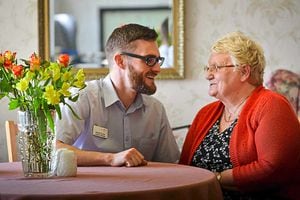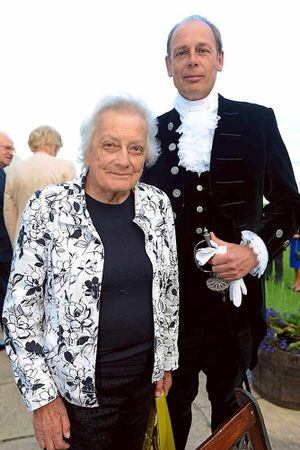Challenging time for funding, says Shropshire care homes chief
There is an air of philosophical resignation as David Coull talks about the latest promise of more money for the NHS.

"At the moment the Government is talking about giving the GPs more money so they can open at weekends," says the Shropshire care homes chief. "Nobody ever offers anything like that to the care sector."
Mr Coull, who is chairman of Shropshire Partners In Care, says that while the NHS benefits from ring-fenced budgets and huge political clout, the organisations that provide care for the elderly endure something of a Cinderella existence.
He says: "Before the election, the Conservatives pledged an extra £8 billion to the NHS. Basically they said there would need to be a few efficiency savings and then asked 'how much do you need?' But I don't think social care is seen as being as sexy as the health service."

One of the biggest issues facing our county is also one of the least-talked about.
The population here in Shropshire is ageing. We are living longer and we are more likely to survive serious illness. Doctors and consultants are able to prolong our lives using a plethora of treatments, including better medicines and surgical interventions.
All of that comes at a cost, of course. And yet it is a price that we seem ill-equipped to pay.
The care sector is facing numerous challenges, not least the ageing population. The question of how we are going to look after the elderly at a time when budgets are being squeezed has yet to be adequately addressed.
In some areas of society, there has been a collective burying of heads in the sand; a hope that things will all be alright and that worrying about it too much won't do any of us any good.
We read too often of bed blocking, of the NHS and council social services departments seemingly duelling over who should foot the bill.
Such examples of complacency and dysfunction within our care sector are deeply alarming. Our collective failure to address the issue of an ageing population can only place additional pressure on both the NHS and the care sector.
It is time for a fresh approach. We need to examine the issues openly and honestly. We need to ask some uncomfortable questions, for instance: are surgical interventions to extend life for a short period of time either sensible or desirable?
One man better placed than most to comment on the issues is David Coull, Shropshire's care homes chief. Mr Coull has described the issue of our aging population as being less "sexy" than the NHS, which presumably means it is not as much of a vote winner.
Why not? We are facing a tremendous challenge and have to face fundamental questions about our ability to look after the elderly. The statistics are frightening – both in terms of cuts to budgets and the figures showing the increases in the number of elderly people.
We must address the most basic questions: Do we want the elderly to be looked after? Do we want to be looked after when we are elderly? It is a bleak picture but one which we cannot ignore. Shining a light on the issue is just the beginning – what is needed is a proper discussion nationally about how we tackle this issue.
Mr Coull is chief executive of Coverage Care Services, the largest provider of care services in Shropshire. The not-for-profit company runs 14 homes across the county, and last month marked the beginning of work on an £8 million residential and nursing home in Sundorne Road, Shrewsbury.
But his company is just one of some 200 providers across the county, offering services ranging from round-the-clock nursing care to simple help for people in their own homes. And while demand for such services is set to increase exponentially over the next 15 years, the organisations providing them will be forced to compete for an ever-shrinking funding pool.
Cuts in Government support for local authorities have seen adult social care budgets cut by 31 per cent over the past five years, according to the Association of Directors of Adult Social Services (Adass). And the organisation warns a further £1.1 billion of cuts are planned for the present financial year.
Over the past year, 16,000 fewer people in England received home, nursing or residential care despite increasing demand from an ageing population and better life expectancy for those with disabilities. Adass says councils have been forced to tighten the criteria for those they help, resulting in thousands more people being left lonely and unaided at home, putting extra pressure on NHS services.
Ray James, president of Adass, says: "
Short-changing social care is short-sighted and short-term."
The largest proportion of the cuts – almost 30 per cent – fell on home care for older people, meaning that many more care visits will be limited to just 15 minutes a time, as well as it becoming harder to access home care in the future.
Mr Coull, who began his career as an NHS nurse some 40 years ago, says the irony is that while much is made about funding for hospitals and GP services, the shortage of money for social care has itself increased pressure on NHS resources.
Last year, a survey by Age UK showed that since June 2010 an estimated 1,928,255 bed days were lost to the NHS at a cost of more than £526 million to the taxpayer, because patients were being kept in hospital while they waited for social care.
It is not a problem that is going to disappear. According to Government figures, the number of people aged 85 and over in Shropshire is expected to have risen by 195 per cent from just 7,000 people in 2006 to a considerable 20,600 by 2031. In Bridgnorth the figure is likely to rise to 223.7 per cent, while in south Shropshire it is predicted that one in 14 people will be aged 85 or over by 2031.
Given there is unlikely to be a significant boost to social services budgets any time soon, how will care providers cope with increasing demand? Mr Coull says that there will need to be major changes in the way services are delivered, with the different providers and NHS increasingly sharing resources such as staff.
In a further twist, the previous coalition government pledged to cap the private contributions that individuals will have to make for nursing care at £72,000, but Mr Coull is sceptical about how many people will benefit. He points out the cap will not include the cost of board and lodgings, which will still need to be paid.
However, despite his concerns about funding, Mr Coull says care for the elderly has improved considerably compared to 30 years ago.
What he does say, though, is that politicians of all parties need to be more open about the financial pressures that result from Britain's ageing population.
How the older generation have a vital role to play
There was entertainment, trepidation, inspiration and a few robust words thrown in, writes Shirley Tart. But the idea of Shropshire's High Sheriff David Stacey to put the spotlight firmly on the older generation and invite hundreds of people to witness the result was, to all intent, a brilliant success.

Straplines fell over each other for attention: Why We Should Love Later Life, for instance and Growing Old Disgracefully, the tag also slapped on her one-woman show by columnist, writer and agony aunt Virginia Ironside. The bespectacled 'prim headmistress lookalike' actually appeared very graceful indeed until she took to the stage and became charmingly disgraceful. She also used a very naughty word. In public. In front of many who would have been at least mildly surprised. But nobody dozed.
The evening at Packwood Haugh School, Ruyton-XI-Towns began with an introduction from the High Sheriff about his interest in not only the care of our increasingly older population but also the great contribution they can still make. David's interest is well established. His father now lives with dementia but his working life included being both a priest and a director of social services.
Professor James Goodwin, head of research at Age UK, gave his prediction that the first person to live to 135 is almost certainly walking the earth now. Probably in Japan. Encouraging us to embrace the golden years which used to be called old age, the Professor said: "One reason we should love older life is that some things look better as you get older and some things are worth waiting for. We have successfully reduced the risks of death with people living longer and better. For instance there is a 92-year-old American regularly carrying out operations on eyes."
At 91 and as clear a thinker as ever, the amazing Baroness Mary Warnock got the audience thinking. One of her present, deeply held beliefs, is that when people retire from their first, long term career, they can in so many cases easily start a new life and new career. Her platform was teaching. And she wants to see those from many different backgrounds doing just that, using their own vast experience of life.
Dr Bill Gowans, who was a Shrewsbury GP for 25 years and is now vice-chairman of the Shropshire Clinical Commissioning Group, told his audience that the most fulfilling things he had learned came from working with elderly people and those who were dying.
He said: "I also meet a lot of very distressed elderly people. Isolation can shorten lives more than high blood pressure or obesity. About 60 to 70 per cent of those in hospitals are elderly. Hospitals are no longer 'places of hospitality' and are mostly not places for elderly people which is nobody's fault.
"But home is where older people want to be, with care brought to them rather than the other way round. And in the end, that's all about relationships."





